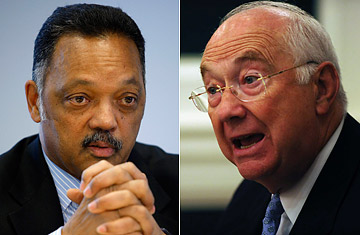
Reverend Jesse Jackson, left, and Former Senator Phil Gramm
The Fourth of July has come and gone and the August recess is a few weeks away. It's summer's dead center point and even the obsessive presidential candidates seem to be bowing to the season with unusually sane schedules. They're still flying around the country at a steady pace, from swing state to fund raiser to photo op, still taking the occasional swipe. But neither is breaking a sweat.
The news cycle, however, refuses to slow — and thanks to Jesse "hot mic" Jackson, Phil "nation of whiners" Gramm, its pace picked up a bit this past week.
The Rev. Jackson threatened Obama's manhood in a whisper on Fox News. McCain adviser Gramm seemed to minimize voters' economic pain by declaring a "mental recession." Jackson's open microphone criticism of Obama for "talking down" to black people was replayed endlessly (and part of the fun was watching the media describe what it is, exactly, that Jackson wanted to do to Obama.) But by the end of the week the consensus was that Jackson had done Obama a favor, as the contretemps give Obama the freedom to distance himself from Jackson without directly offending his African-American base. Gramm's comments about economic hardship may be harder for McCain to shake, explaining the candidates immediate on-camera denunciation. They play right into negative stereotypes about Republican insensitivity to the suffering that McCain is trying to escape.
Meanwhile, political experts assured us that it was too early in the election cycle for much of this to matter. The public polls have been rather steady over the last month, with Obama maintaining a small, if slowly growing lead over McCain, which is far below the knock-out advantage that many had predicted in such a Democratic friendly cycle. Both campaigns long ago admitted that this campaign would come down to the economy, a growing problem for which neither candidate is offering many short-term fixes. Pew pollsters re-released data that showed that about twice as many Americans pick the economy as the most important issue (44 percent) than choose the Iraq war (24 percent). This is almost a complete inversion of the responses last November, when Americans chose the Iraq war (32 percent) at twice the rate as the economy (15 percent).
Whether McCain gets an opportunity to fix to the economy depends heavily on solidifying his own economic situation. In a conference call on Thursday, McCain's campaign manager, Rick Davis, released new fundraising numbers, showing that McCain had grabbed $22 million in June, his highest monthly haul ever. (By comparison, it matches Obama's May total, the Democrat's lowest of 2008.) That leaves McCain with $27 million cash on hand, which can be added to another $67 million from the Republican National Committee. Davis also dropped this claim: Between April and the end of June, the McCain campaign has outspent Obama nearly three to one on television advertising buys, though that statistic is sure to fall now that Obama is moving onto general election footing.
One area where both candidates remain on equal footing is in their ability to score points off of world events. This week's biggest opportunity came via the Iranian missile tests, which Obama reacted to by calling for more aggressive diplomacy than the Bush Administration has been willing to take. "If we don't, then we're going to continue to see rising tensions that could lead into real problems," Obama told NBC's "Today" show.
McCain used the tests as a chance to press for an expanded missile defense system in Europe, with sites in Poland and the Czech Republic, an idea that is opposed by Russia. "Ballistic missile testing coupled with Iran's continued refusal to cease its nuclear activities should unite the international community in efforts to counter Iran's dangerous ambitions," said McCain. These comments come as Obama continues to plan an overseas trip, meant both to burnish his foreign policy credentials and disable some McCain's criticism that he hasn't had a first-hand assessment of the conditions on the ground in America's theaters of war.
Obama's trip — let's not quite call it a summer vacation — should have him back just in time to pick a vice presidential nominee and, like Mccain, start cramming for his party's convention. Then sprint will begin. For now, though, the campaign remains at a gathering trot.
